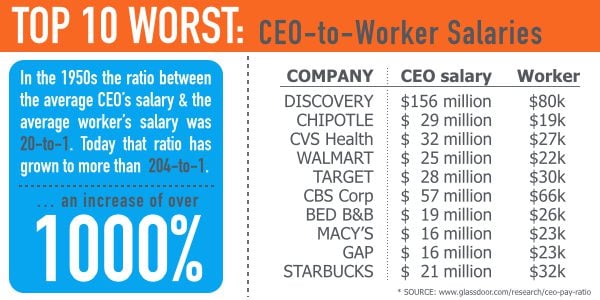I’ve been beating the income inequality drum for quite some time now. The one of the most unnerving developments in the history of our society. Income inequality will destabilize even the most resilient society, and it nearly always leads to corruption (see Citizens United). I read an editorial in the Chicago Tribune this morning that argues marriage is undermined by income inequality.
The editorial is based on a study by University of Virginia sociologist Sarah Corse and Harvard sociologist Jennifer Silva, who interviewed 300 working- and middle-class Americans about marriage. Their paper, “Intimate Inequalities: Love and Work in a Post-Industrial Landscape,” chronicles the impact of our societies changing economic situation.
What their research showed was that increasing economic pressure on lower, and lower middle class workers has become a disincentive in regard to marriage. At the same time marriage has changed in our culture to a “therapeutic” model – based on what will make a person more happy (as opposed to Christian Marriage that is about the life of the world). Marriage is viewed more like a luxury item.
The research seems to suggest that this kind of marriage is undermined by the growing income inequality, and the fact that low wage workers, and lower middle class workers feel less stable, less willing to take the risk of needing to “provide materially and emotionally for others.” Here’s an excerpt.
Thanks to falling working-class wages, the outsourcing of American manufacturing, the thinning of company benefits, and the rise of part-time and self-employment, American jobs are, in many ways, less stable than ever. Unskilled workers without a higher education are finding it more difficult to translate blue-collar work into middle-class stability. Many of the working-class Americans interviewed by Silva and Corse are now too concerned with maintaining their “own survival” to “imagine being able to provide materially and emotionally for others.” Meanwhile, marriage itself has transformed into a luxury item. Over the past century, the old model of obligatory American marriage, which was “rooted in male authority” and “backed by both religious and legal mandates,” gave way to “companionate” marriages dedicated to prioritizing “the couple as equal individuals” in the family structure. Now, as Silva and Corse tell it, a new age of “therapeutic” marriage has arisen to focus on the “happiness, equality, mutuality and self-actualization of individuals.”
That self-actualization doesn’t come cheap. The rise of the freelance economy and the decline of traditional marriage has made life less regimented for middle-class Americans, too. But middle-class people benefit from the educational backgrounds and salaries necessary to stabilize their own careers and relationships outside of these traditional social structures. People like Earl and Jan can spend their paychecks on therapy, horses, college and gyms to stay happy together. Even middle-class Americans who can’t afford to buy their kid a pony have more resources to maintain their relationships through economic instability. For people at a certain education level and salary potential, the self-employment economy can provide the flexibility to spend time with their families; sharing resources with a partner is more likely to be an investment than a risk.
But people like Cindy and Megan can’t afford to invest in this new model (and the old model, where a male breadwinner provided for the family, doesn’t exist anymore). As traditional work and family structures crumble in the United States, middle-class Americans have the money to build relationships, yet remain satisfied as individuals. For working-class Americans, personal stability sometimes requires staying single and avoiding the risk of abuse, abandonment and even more economic and emotional disruption.
What do you think of this?
The line that interests me the most in terms of its connection to income inequality is, “Unskilled workers without a higher education are finding it more difficult to translate blue-collar work into middle-class stability.” The income boost which used to help wage workers make the move to the middle class and stay there is now going to the top 1% in our economy.
The line that most interests me in terms of marriage is, “a new age of ‘therapeutic’ marriage has arisen to focus on the ‘happiness, equality, mutuality and self-actualization of individuals.'” I think this is far from the Christian view of marriage.












